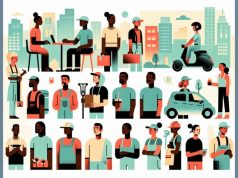In the changing topography of the modern workforce, the gig economy stands as both a monument to entrepreneurial spirit and a crucible of labor rights concerns. As the gig economy balloons, with companies like Uber, Lyft, and DoorDash at the helm, its growth invites a reckoning with the established norms of work and worker protections. This metamorphosis raises urgent questions: How can labor unions, traditional bulwarks of workers’ rights, extend their protective canopy over gig workers? What are the current battlegrounds on which these modern laborers contest their rights? And what can the discerning readers of The Work Times do to buttress this nascent front of labor rights?
The enticement of the gig economy lies in its flexibility, autonomy, and the promise of being one’s own boss. However, beneath this veneer of freedom, many gig workers find a reality marred by precarious job security, fluctuating incomes, and an absence of employer-provided benefits. Traditional employees could once rely on labor unions to champion their rights for fair wages, health benefits, and safe working conditions. Yet, these traditional mechanisms do not neatly graft onto the gig economy’s framework, leaving gig workers in a vulnerable position.
The challenges are multifaceted. Gig workers are often classified as independent contractors rather than employees—a distinction that exempts businesses from granting them the benefits and protections afforded to regular workers. They are frequently left without health benefits, overtime pay, and unemployment insurance. Their wages can be unpredictable and sometimes fall below minimum wage after accounting for expenses and unpaid labor hours.
For labor unions, the task ahead is Herculean but not insurmountable. Adapting to represent gig workers means opening the door to a diverse and often dispersed workforce. It requires innovative organizing strategies, such as digital platforms for collective bargaining, and advocating for legislation that reflects the realities of gig work. The Protecting the Right to Organize (PRO) Act in the United States is one such legislative endeavor that aims to strengthen union power and expand labor protections to include independent contractors.
Yet, change does not rest solely on the shoulders of policymakers and labor leaders; it’s a collective effort. Readers of The Work Times can take an active role by educating themselves about the plight of gig workers and leveraging their consumer power to favor companies that offer fair labor practices. Furthermore, they can support organizations and initiatives that aim to promote gig workers’ rights and amplify their voices in public discourse.
Ultimately, solidarity remains the strongest weapon in any labor movement. By fostering unity across sectors, gig workers and traditional employees alike can stand together in demanding a more equitable and inclusive labor market. The values embedded within The New York Times’ readership—awareness, advocacy, and action—can serve as guiding principles for The Work Times community as we navigate the new frontier of labor rights.
In our collective push for progress, we have the power to reshape the future of work into one that honors the dignity of all laborers. The gig economy may be a brave new world of work, but it is one that should not be entered without the map of worker protections and human rights firmly in hand.




























